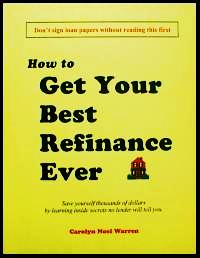 |
Mortgage-Helper.com | |
| Your only unbiased source for mortgage and credit information. I don't take applications or "harvest leads." I help people of all credit types avoid ripoffs and save money - since 1999. -- Carolyn Warren |
 |
Mortgage-Helper.com | |
| Your only unbiased source for mortgage and credit information. I don't take applications or "harvest leads." I help people of all credit types avoid ripoffs and save money - since 1999. -- Carolyn Warren |
Making as much money as possible is the job and the number one priority of your loan officer. Whether you go to your bank, a loan officer for a direct lender-company, or a mortgage broker, making money is the number one goal. That is the point of truth from which is start.
On the contrary, your number one goal is to save money. This puts you and your loan officer on opposite sides; and yet, you need to develop an amiable relationship with one another. If you don't, one of you is going to get badly hurt.
If your loan officer fails to gain your trust and loses your business, that hurts her (or him). If she fails to offer you a loan that is attractive enough for you to take, then she makes no money at all.
On the other hand, if you fail to negotiate--in a savvy yet amicable manner--a good loan, with good terms and low interest rate and low fees, then you become the big financial loser. Of all the ways to lose, losing big financially is one of the most painful-- especially when it involves your home.
As a professional in the mortgage business who has worked for a direct lender, a finance company, and a mortgage broker, I have had opportunity to see behind the scenes in all types of companies. Furthermore, I worked as a licensed notary loan signer, which means I also signed loan papers for dozens of other lending companies; this gave me the opportunity to see what the competitors were doing with regard to their loans. For example, I signed loans for Chase Manhattan, Washington Mutual, Countrywide Home Loans, Full Spectrum Lending, World Savings, Irwin Financial, Conseco Finance, Ameriquest Mortgage, Bank of Tennessee, Union Planters, Wells Fargo, and E-Loan, as well as others. You might say, when it comes to loans, I have seen it all--the beautiful, the mediocre, the bad, and the scandalous. It's all out there.
Some people get amazingly cheap loans. They cost very little, and quickly make up for it by saving the home owner so much money. The loan officers do not love to make these loans, because they don't make much money on them; but they do make some money, and something is better than nothing. A loan for which a loan officer makes only a pittance may pay off in other ways, such as gaining a loyal client for life who will do several more loans with him, or gaining referral business which will generate more income.
Some people get okay loans, but, in all honesty, they could have done better for themselves had they taken the effort to become educated about loans. These people struck a good rapport with their loan officer, instantly fell into trust, and proceeded happily ahead without being smart enough to ask for a better deal. It would have been so easy to save themselves several thousand dollars, had they only taken the trouble to find out.
Some people get such horrible loans, it is an outright scandal. Of course, they do not know this at the time. One loan officer I knew confided in me that she could never ask any of her past clients for a referral or a recommendation.
"They all hate me once they figure out what kind of a loan I've given them," she said. By then, it's too late. Once the loan is recorded and funded, there is no turning back. No one thinks this is going to happen to them. No one expects it. No one signs loan papers knowing they are getting ripped off. Yet, it happens every day. Unsuspecting people, smiling and happily thanking their charming loan officer, are getting taken advantage of. I know, I have seen it with my own eyes and heard it with my own ears over and over again.
The majority of the people are in the second category mentioned above. They are not getting horribly ripped-off, but they are not getting the beautiful, amazingly cheap loan they could have gotten either. The purpose of this writing is to enable people to move from the horrid and mediocre loan categories into the beautiful, cheap loan categories.
Based on how long you have had your loan, how much you paid for it, the size of your loan, how long you plan to keep your house, your credit rating, and how much money you will save by refinancing, you make your decision. I will show you an easy formula everyone can use, simply by filling in the blanks, to determine whether or not it makes good financial sense for you to refinance. (You don't need to be good at math.)
This question is on everybody's mind. Even the loan officers'. While no one can predict rates with certainty, there is information available that can help you make a good choice. Furthermore, you need to protect yourself from losing a rate lock, because a loan officer failed to lock you in on the day you requested. It is a common practice for loan officers to continue to "float" the loan even after the home owner has requested a rate lock-in; the loan officer may opt to gamble on the rates going down so he will be able to make a larger commission. If rates go up instead, you may be hearing a sad excuse from the loan officer.
Most home owners are surprised at the fees in a refinance. Are all those fees really necessary? Perhaps not. Some lenders charge more than others. And some mortgage brokers, even within the same office, charge more than others. If you ask your loan officer or mortgage broker if you can eliminate some of the fees, you will get a "Sorry, but no." However, some fees are negotiable and some are waivable altogether. The trick is knowing which is which.
A mortgage broker I work with had a client who threw a fit over paying the $300 appraisal fee and absolutely refused to pay for it. Of course, the appraisal is required, and the appraiser, who is an independent contractor, has to get paid for his work. The mortgage broker was so incensed at the ridiculous demand of her client that she gave in just to stop the tantrum, but then added an even larger fee elsewhere in the closing costs to make up for it.
On the other hand, another mortgage broker I know always charges a $600 unnecessary fee to enhance profits. When I exclaimed over this large ancillary fee, she responded by saying no one had ever objected to paying it. If they had, she would have reduced it, she said.
When it comes to fee-paying, it is important to know which is which, and how much is too much. I'll give you the inside scoop.
This is a tricky issue. Companies purposely make it hard for people to compare loans, and for good reason. First, they don't want to lose you to a competitor, and second, they want to make as much money as possible.
I attended an expensive training seminar for one of the largest lenders in the U.S. One of the lovely things I learned was how to give a client who is shopping for a loan an "apple" and a "orange" to compare. That's right, the trainer actually said outright, "Give them apples and oranges to compare, so they won't know which loan is best." Then he went on to tell how to lead people to the pricier loan. Then to compliment the person on their excellent choice and to say with enthusiasm, "That's the one I would have chosen too!"
It was an intensive three-day training seminar. The instructor was outstanding, one of the best I had ever heard. At the end, we took a test, and I got the highest grade. Then I went home and quit. I refused to employ such tactics and to sell such loans. Do not think this was some small, sleazy company; it was and still is one of the major national lenders in the U.S.
I will expose these ploys, and more importantly, teach you how to shop for and compare loans. (Don't bother asking for the APR--companies have invented ways to misconstrue that number. APR is definitely not the way to shop for a mortgage.)
Going beyond explaining what points are, I tell you the truth behind the facade. This is another way some companies take advantage of home owners. I have seen charming loan officers gouge their clients for more money than you would want to know about, and all the while, the client was smiling and thanking the loan officer for the loan. I think it's high time people learn the truth about points.
No, of course not. Do you think a bank or mortgage company is going to loan you money for nothing? Do you think a loan officer is going to work for hours and hours on your loan for free? Still, in some situations, the so-called "No Cost Refinance" is a good loan to take.
Sometimes yes, and sometimes no. I give you the formula for success and for making a smart decision.
You should quit paying the private mortgage insurance fee as soon as possible. Why? Because it does absolutely nothing for you. This insurance insures the lender, not you, and yet you pay the monthly premium for it. Your goal is to quit paying the lender's insurance premium as soon as possible. I'll give you a secret as to how to quit it even sooner than expected. I'll tell you how I helped one couple drop PMI after only one year.
A whole smorgasbord of loans is available: conventional, FHA, VA, 2/28, 3/27, 30-year fixed, 2/1 buy down, step-down program, ARM, 7-year balloon, etc. Two of these I recommend against. The others are good in various situations. I'll show you how to pick the right one for your own situation, and why you should avoid the 3/27 and the step-down programs.
Beware of these:

|
What's In This Book
|
You have nothing to lose.
No-Risk 100% Unconditional Money-Back Guarantee.
Order this excellent information-packed book now.
